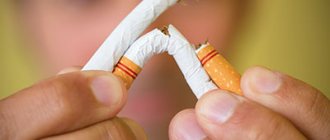Anonymously
Around the clock
Attention! The material contains information about substances, the use of which can cause serious harm to your health!
Nicotine addiction is one of the most common addictions. About 79 percent of people smoke a pack a day. Many people think that this is self-indulgence, but the effects of nicotine on the body are extremely negative.
- What is nicotine?
- Nicotine composition
- Chemical formula
- The effect of smoking nicotine: mechanism of action
- How is addiction formed?
- The benefits of nicotine
- Nicotine test
- How much nicotine is removed from the blood?
- Nicotine in the blood
- Nicotine in urine
- How to remove nicotine
- Types of nicotine
- Salt nicotine
- Liquid nicotine
- Nicotine in cigarettes
- Harm of nicotine to the human body
- Nicotine and the lungs
- The effect of nicotine on blood vessels
- The effect of nicotine on women's health
- Effect of nicotine on human development
- The effect of nicotine on fetal development
- The harm of nicotine to the brain
- Effect of nicotine on blood: red blood cells
- Effect of nicotine on the nervous system
- Effect of nicotine on the stomach
- The effect of nicotine on a teenager
- Nicotine addiction treatment
We will select an individual treatment plan
Free consultation 8-800-200-27-23
What is nicotine?
Nicotine is an alkaloid that is released from the shoots of plants of the nightshade family (tomato, eggplant, tobacco, regular potatoes). The main synthesis occurs in the roots, and the accumulation of nicotine occurs in the leaves and shoots. The maximum concentration of nicotine found in tobacco is about 14 percent.
Nicotine composition
Nicotine is made up of carbon, hydrogen and nitrogen atoms. Almost all alkaloids affect the human nervous system. For example, caffeine, cocaine and morphine. The physical and organoleptic properties are as follows - nicotine is a bitter, oily, dark liquid. At certain temperatures it mixes easily with water.
Chemical formula
The effect of smoking nicotine: mechanism of action
Nicotine in the blood quickly enters the brain, stimulating certain receptors. A person feels a surge of strength, improved mood, and relaxation. Dopamine (the joy hormone) is actively produced, and nicotine begins to integrate into the body's metabolic processes. It’s not for nothing that smokers definitely need to smoke a cigarette after eating, sleeping, etc.
There are no special enzymes in the body that could break down nicotine into safe compounds. Therefore, the toxic effect of the substance is quite strong.
How is addiction formed?
After the first cigarette smoked, a person does not feel any pleasure - nausea, dizziness, and increased salivation begin. However, in most cases, the future smoker overcomes the unpleasant symptoms and continues smoking.
A cigarette is most often associated with something pleasant, for example, a friendly conversation, a party. Rest from work, etc. In most cases, people start smoking in adolescence, when they want to appear more mature and respectable.
Since nicotine enters the body continuously, it is integrated into almost all systems. As soon as the effect of the substance wears off, the smoker begins to feel an urgent need for cigarettes.
HOW TO MOTIVATE A DEPENDENT FOR TREATMENT
The benefits of nicotine
Nicotine is widely used in medicine, and here's why:
- Accelerates thinking abilities and reactions.
- Has anti-inflammatory properties.
- Has antidepressant properties.
- Normalizes appetite in case of constant craving to eat something.
- May prevent the development of Alzheimer's disease.
But if this substance has such beneficial properties, then why is smoking harmful to health? The answer is simple - most of the harmful effects come from burning the cigarette. A person, along with nicotine, inhales carcinogens and other toxic components. Don’t forget about the financial side - buying cigarettes breaks a significant hole in the budget.
Nicotine test
The test for the presence of nicotine in the body is carried out by checking the urine. If it contains cotinine (a breakdown byproduct), then we can talk about smoking or another method of ingesting nicotine.
Literature:
- Risk factors for arterial hypertension / V. R. Weber, B. B. Fishman; Feder. education agency, Novgorod. state University named after Yaroslav the Wise, Novgorod. scientific Center of the Northwestern Branch of the Russian Academy of Medical Sciences. — St. Petersburg: Novgor. state univ., 2005 (St. Petersburg: Printing house “Science”). — 207 p.
- Tobacco smoking in children and adolescents: hygienic and medical-social problems and solutions: monograph / A. A. Baranov, V. R. Kuchma, I. V. Zvezdina. - Moscow: Litterra, 2007. - 213 p..
- Assessment of the effect of smoking on visceral organs and regulatory functions of the body / Ibragimova Evelina Enverovna, Yakubova E.F., Yakubova Z.A. / 2021 / Population health and habitat.
How much nicotine is removed from the blood?
The exact time of elimination of the substance cannot be determined. The fact is that each person has his own characteristics and metabolic rate. Therefore, we are talking about approximate figures.
Nicotine in the blood
According to the results of the studies, nicotine is completely eliminated from the blood within 1-3 days. The duration of a substance’s presence in the blood can vary both up and down.
Nicotine in urine
Pure nicotine is eliminated within 24 hours. However, cotinine remains in the urine, which is detected within several days. The rate of elimination is affected by age, the presence of chronic diseases, lifestyle and much more.
Do not throw? Smoking and medicating? Or quit and... get treatment again?
It's better to quit - at least those who have not yet developed chronic hypertension have a chance to significantly reduce its risk. For those who quit smoking, active restoration of the cardiovascular system occurs within approximately 6-18 months.
Within 2 – 5 (and sometimes more years) the condition returns or significantly approaches age-related and other norms. The sooner a person quits, the less smoking experience he has, the faster and more completely these processes will take place, the lower the risk of developing hypo- or hypertension.
There is no doubt that many factors play a role in the development of hypertension, including those that are categorically not related to smoking: genetic predisposition and dietary habits; climate and working conditions; body weight and mental stress.
However, the fewer risk factors, the less the load on the target organs of hypertension, the weaker their provoking effect. Smoking and blood pressure go hand in hand. You must either feel a sense of self-preservation, or... you can only hope for a favorable outcome.
How to remove nicotine
Is it possible to speed up the elimination of nicotine from the body? There is a lot of advice on this matter on the Internet. However, not all of them are applicable. For example, the recommendation to visit the sauna more often is dangerous, since smokers very often suffer from heart disease. High temperatures can contribute to a heart attack or heart attack. Intense sports activities are also contraindicated, especially if the person has not been involved in any sports.
Find out treatment recommendations without leaving home for free
To select a treatment plan, you just need to leave a request, we will contact you to select the time and specialist you need
Submit your application
Safe recommendations include increasing the consumption of clean water, taking vitamin C, and increasing the number of walks in the fresh air. Need to remove nicotine quickly? Then it is best to consult a narcologist - he will carry out a set of detoxification procedures to remove the substance from the body. However, not everything is so simple, because smoking is not only a physiological craving, but also a psychological one.
Does smoking increase or decrease blood pressure?
Does smoking and blood pressure definitely mean increased blood pressure? Not always. If it were possible to consider a certain ideally and unambiguously functioning human body, where all processes occur in accordance with schemes and rules, then hypertension would be inevitable.
However, in addition to stimulating the production of neurotransmitters, nicotine creates conditions under which the smoker’s body is in chronic hypoxia. With it, chemoreceptors (special mechanoreceptors, which, among other things, are responsible for vascular tone and breathing) in response to nicotine produce the so-called Bezold-Jarisch reflex, which is characterized by a decrease in heart rate and systemic hypotension.
Cigarette smoking and blood pressure can be related to each other in completely unimaginable ways. For example, the well-known fact of chronic hypovitaminosis in smokers and blood pressure - what do they have in common? However, it is known that a constant deficiency of vitamins C, group B and E are provoking factors for hypotension.
For the development of hypertension, the presence of pathological processes in the so-called target organs: kidneys, heart, blood vessels is important. And if many people more or less guess about the importance of the kidneys (more precisely, their pressor function) and the heart in the formation of hypertension, few smokers know that with obliterating endarteritis - a typical “nicotine” disease - blood clots often form (the so-called Virchow’s triad) , and blood clots, in turn, cause atherosclerotic changes in blood vessels.
Then the pathological chain continues: vascular atherosclerosis (especially the femoral arteries, iliac and lower extremity arteries) is a high risk factor for the formation of arterial hypertension.
Types of nicotine
Nicotine comes in different forms. Some are designed for vapes and e-cigarettes. Most often, such a device is a way to quit smoking regular cigarettes. But replacing one dependency with another is not a good idea.
Salt nicotine
It became widespread in Russia in 2021. Adding salt nicotine to a vape creates a fairly high strength of inhaled vapor. The main danger of such a substance is the increased risk of poisoning. The main symptoms of intoxication are nausea, headache, dizziness, fingertips. In this case, you should immediately stop vaping.
Liquid nicotine
The liquid form of the substance is intended for self-preparation of liquid mixtures for vapes and electronic cigarettes. The concentration should be calculated extremely accurately so as not to overdose. Insufficient nicotine for those who want to quit smoking regular cigarettes is also highly undesirable. The fact is that this can lead to increased cravings for traditional smoking.
Nicotine in cigarettes
Nicotine in tobacco products is absorbed most quickly and is almost completely absorbed. Information about its quantity is indicated on the packaging. The number of mg resins is also written. Combustion and its decay products are the main danger of smoking conventional cigarettes.
Some nuances that lovers of “smoke” should know
Naturally, the question arises: is it possible to smoke with high blood pressure, especially since such negative processes constantly occur? Let's consider this issue in more detail.
Although smoking and hypertension go, as they say, “hand in hand,” in reality everything is not so scary. If a tobacco lover has a solid history of using it, then compensatory mechanisms in his mechanism are activated. They can significantly reduce the severity of the negative effects of nicotine use. But over time, these opportunities decrease as the resources of biological systems run out. It is then that a hypertensive crisis and other negative consequences from tobacco use become most likely.
Harm of nicotine to the human body
Why is nicotine dangerous? Its main harm is the narrowing of blood vessels and capillaries. Due to lack of oxygen, all organs suffer. In the case of traditional smoking, harmful tars, carcinogens and combustion products are added to this factor.
Nicotine and the lungs
A constant lack of oxygen leads to the fact that some small capillaries almost completely atrophy. The bronchi gradually lose their ability to cleanse themselves, and smokers suffer from a characteristic cough. It becomes increasingly difficult to breathe, and the saturation level may decrease significantly.
The effect of nicotine on blood vessels
Constant narrowing of blood vessels leads to poor circulation. The risk of thrombophlebitis, varicose veins, and heart attack increases. In addition, a person who smokes constantly has cold hands and feet. This happens due to the narrowing of small capillaries.
In addition to the danger of blood clots, problems with blood vessels also cause aesthetic defects. These are spider veins, dilated veins in the legs, deterioration of complexion.
The effect of nicotine on women's health
The weaker sex quickly gets drawn into all bad habits. The harmful effects of cigarettes or alcohol are even stronger for women. The hormonal system suffers the most. Failures in its operation lead to infertility, menstrual irregularities, polycystic ovary syndrome, hair in unnecessary places, weight gain, etc.
The external aspect is also important - as a result of poor blood circulation, a gray tint of the skin appears, hair becomes brittle and falls out, and nails become brittle. Wrinkles, yellow teeth and a smoky voice complete the picture.
Effect of nicotine on human development
The harm of nicotine extends to human development. Instead of reading a book or watching an interesting movie, the smoker will take a smoke break. He will also refuse to attend a long excursion or exhibition where there is no opportunity to smoke. If a person is dependent on cigarettes for more than 25 years, then it is difficult for him to endure even half an hour without smoking.
In addition, deterioration in brain supply significantly reduces memory, which has a detrimental effect on study or work.
The effect of nicotine on fetal development
Smoking during pregnancy has an extremely negative effect on the baby. Each cigarette puff increases fetal hypoxia, which leads to disruption of the formation of important body systems. The risk of congenital pathologies, such as cleft palate, increases. During pregnancy, it is harmful not only to smoke regular cigarettes, but also vapes, hookahs, and electronic cigarettes.
Recently, many pregnant women continue to smoke, arguing that abruptly giving up nicotine is harmful to the baby. This is an excuse - at any stage it will be better for the child if the mother gives up this habit.
The harm of nicotine to the brain
The brain begins to experience a lack of oxygen. At the same time, nicotine stimulates the production of dopamine. As a result, without another cigarette, a person begins to feel irritated, anxious, and angry. If nicotine is not supplied for more than a day, drowsiness, lethargy, loss of strength and mood are observed.
Effect of nicotine on blood: red blood cells
There is usually a significant excess in the number of red blood cells - erythrocytes - in a smoker's blood. In addition, the number of defective cells increases. The result of such indicators can be a variety of diseases.
Effect of nicotine on the nervous system
Constant pressure surges and vasoconstriction lead to increased stress on the central nervous system. A cigarette is a source of relaxation, joy, pleasure.
Effect of nicotine on the stomach
As nicotine accumulates, it gradually damages the mucous membranes of the stomach. In this case, the substance actively participates in the digestion process. Many quitters note that in the first weeks of quitting smoking they felt bloating and heaviness in their stomach.
Smoking on an empty stomach is especially dangerous, since at this time the gastrointestinal tract is especially vulnerable. This increases the risk of ulcers and various cancers.
The effect of nicotine on a teenager
The effect of nicotine on a growing organism is especially strong. There is a significant decrease in memory, it becomes more difficult to study, and colds are becoming more common. There is a high probability of hormonal imbalance. Vision suffers because blood circulation in the eyeballs deteriorates and pressure increases.
A teenager gets used to smoking much faster, so the number of cigarettes smoked gradually increases. People who smoke from a young age find it very difficult to break this habit.
Content:
- What affects blood pressure (BP) levels?
- How does nicotine affect blood pressure?
- Consequences of long-term smoking
- Nicotine and blood pressure, how to prevent complications
- In what cases does nicotine reduce blood pressure?
Tobacco smoke contains many ingredients that have a negative impact on human health. Regular smoking causes the development of a number of diseases. The cardiovascular system suffers the most. Nicotine increases blood pressure in a smoker, has a toxic effect on the myocardium, impairs its blood supply and promotes hardening of the coronary arteries . All these disorders lead to the development of many diseases that reduce a person’s quality of life. To avoid problems, you need to give up your bad habit in a timely manner, and even better, never start smoking.
Mechanism of action
There is a direct relationship between changes in pressure levels and the effect of toxins entering the body on the nerve centers. Entering the blood, nicotinic acid has an exciting effect on the sympathetic nervous system, which reacts by releasing adrenaline and norepinephrine in an increased volume. Under the influence of hormones, arteries spasm and heart rate increases.
An increase in pressure level will be observed 10 minutes after puffing. It persists for about an hour, after which it drops to a normal level for humans. The result is persistent spasm and chronic hypertension. The elasticity of the wall of the vascular bed changes, it is in constant tone.
Tobacco includes many dangerous substances, heavy metals, and resins. Their constant penetration into the blood causes metabolic processes to fail. Everything is clear about the reaction of the blood vessels - their lumen decreases, and an increase in blood pressure is observed. Nicotine will also affect the functions of other organs. Impaired liver and kidney function due to damage by toxins also leads to an increase in blood pressure. Another negative consequence is that lung volume decreases. To provide the body with oxygen, the heart has to contract more often. An increased heart rate also leads to increased blood pressure.
Narcotic drugs
Those who are addicted to weed are rarely interested in the question of whether smoking increases or decreases blood pressure. However, they should also know that the use of marijuana and hashish leads to an increase in heart rate and increases heart contractions.
Systematic use leads to:
- chronic increase in blood pressure, increasing the likelihood of heart attack and stroke;
- hyperemia of the eye protein, which is caused by an increase in intraocular pressure.
Using medications to lower blood pressure at this point can lead to loss of consciousness. Systematic smoking of marijuana causes angina and heart failure.
A similar effect occurs on the brain. However, the walls of the vessels of this organ are more delicate and susceptible. Therefore, consumption leads to an aneurysm and a micro-stroke, which may not even be felt by a person. Constantly smoking weed leads to permanently high blood pressure, accompanied by headaches, nausea, and nosebleeds.
What not to do
A common misconception among smokers who have repeatedly made unsuccessful attempts to quit cigarettes is the idea that those who quit smoking can stabilize their blood pressure by returning to their bad habit. Such a game with health cannot end well and the consequences of carelessness will not keep you waiting. If you experience pressure surges while quitting cigarettes, doctors do not recommend:
- overwork;
- ignore symptoms of stress;
- return to smoking, even once;
- overeating or starving;
- abuse alcohol;
- take questionable drugs without a doctor’s recommendation;
- lack of sleep.
DO YOU WANT TO QUIT SMOKING?
Then you need a strategy for quitting cigarettes. With its help it will be much easier to quit.
A clinic where they can help
The harm of nicotine has long been proven, so you need to get rid of the habit. For 22 years, the IMC Addiction By Yuzapolsky clinic has been helping people get rid of addiction using specially developed proprietary methods. Specialists individually draw up a treatment plan according to the smoking history, psycho-emotional and physical condition of the patient.
Experienced neuropsychologists, narcologists, and psychotherapists work with each patient. There are rehabilitation programs for the patients themselves and their relatives. The clinic offers maximum comfort, there is a VIP department and single apartments. In this case, the treatment takes place completely anonymously. If you wish, you can choose an outpatient program.











